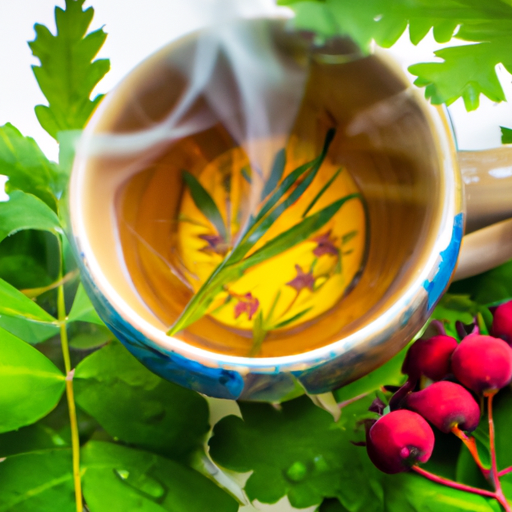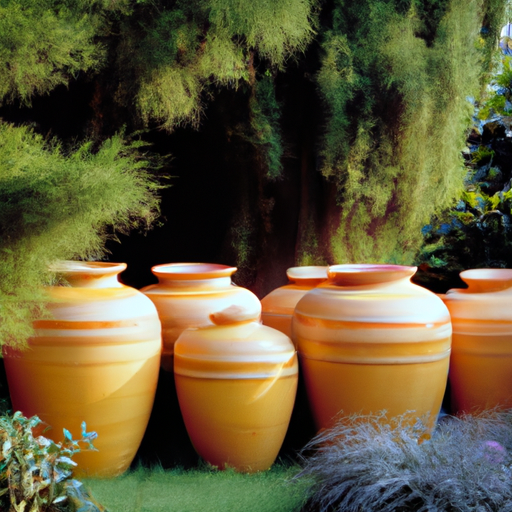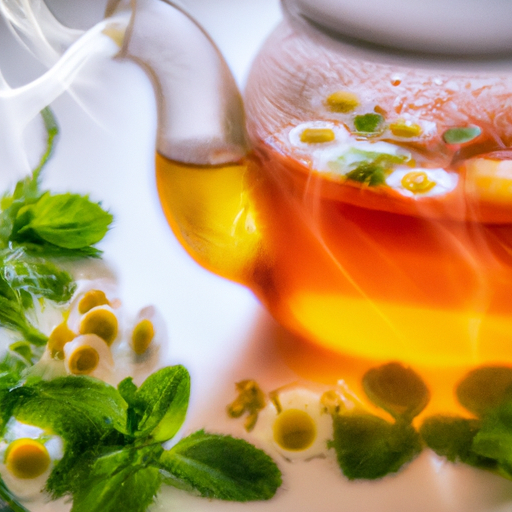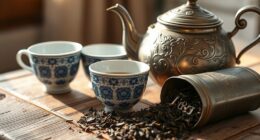It may come as a surprise to discover that France, famous for its passion for coffee and wine, also holds a strong admiration for herbal tea. While the French indeed have a rich coffee culture, herbal tea has carved out a niche in the hearts and teacups of numerous French individuals.
In fact, the popularity of herbal tea in France has been steadily growing over the years, with a wide variety of flavors and blends to choose from.
Now, you might be thinking, ‘But France is famous for its rich culinary traditions, so why herbal tea?’ Well, my friends, the French have always had a penchant for all things natural and wholesome. They understand the power of herbs and their ability to heal and soothe both body and soul. From soothing chamomile to invigorating peppermint, the French have embraced the diverse range of flavors and health benefits that herbal tea brings.
In this article, we will delve into the world of herbal tea in France and explore the most popular flavors that grace the French teacups. So grab a cozy seat, steep a fragrant cup of your favorite herbal blend, and join me on this delightful journey into the heart of French herbal tea culture.
Key Takeaways
- Chamomile tea is the most popular herbal tea choice in France due to its calming and soothing properties.
- Peppermint tea is also widely consumed in France for its refreshing and invigorating flavor.
- Rooibos tea, a South African herbal tea, is popular in France for its ability to aid digestion and relieve stomach discomfort.
- Sage tea is another popular herbal tea in France, known for its rich antioxidants, digestive support, and versatile culinary uses.
Chamomile Tea
If you’re looking for a calming and soothing herbal tea, chamomile tea is the most popular choice in France. It’s known for its numerous health benefits and delicate flavor. Chamomile tea has been enjoyed for centuries. Chamomile is a flowering herb that belongs to the Asteraceae family. It contains various bioactive compounds that contribute to its therapeutic properties.
Drinking chamomile tea is believed to promote relaxation, reduce anxiety, aid digestion, and improve sleep quality. It’s also commonly used to soothe menstrual discomfort and alleviate cold symptoms.
In addition to its medicinal benefits, chamomile tea is versatile and can be incorporated into various recipes. It can be used to enhance the flavor of baked goods, such as cakes and cookies, or added to savory dishes like soups and stews for a subtle floral twist. Some people even enjoy chamomile tea as an ingredient in cocktails or as a base for refreshing iced teas.
Transitioning to the subsequent section about peppermint tea, another popular herbal tea in France, peppermint tea offers a refreshing and invigorating flavor profile.
Peppermint Tea
Peppermint tea is a delightful and invigorating herbal infusion that boasts a refreshing flavor. This aromatic beverage is known for its ability to aid digestion and alleviate stomach discomfort. The invigorating properties of peppermint tea make it a popular choice for those seeking a natural remedy for digestive issues.
Refreshing and invigorating flavor
Nothing can compare to the exhilarating burst of flavor that a sip of refreshing herbal tea brings. In France, there’s a wide variety of refreshing tea blends that are popular among tea enthusiasts. From chamomile to lavender, these herbal teas are not only delicious but also offer various health benefits.
The invigorating flavors of these teas help to awaken the senses and provide a soothing experience. Not only do they offer a moment of relaxation, but they also provide antioxidants and vitamins that contribute to overall well-being. Additionally, herbal teas are known to aid in digestion and relieve stomach discomfort. The calming properties of certain herbs, such as peppermint, can help to ease bloating and indigestion.
Transitioning into the next section, let’s explore how herbal tea helps with digestion and relieves stomach discomfort.
Helps with digestion and relieves stomach discomfort
When you sip on a cup of these refreshing blends, it’s like a cool breeze on a hot summer day, soothing your stomach and aiding in digestion. Herbal teas have been used for centuries as traditional herbal remedies to help with digestion and relieve stomach discomfort. In France, one of the most popular herbal teas for this purpose is peppermint tea. Peppermint is known for its calming effect on the digestive system and its ability to relieve bloating and indigestion. The menthol in peppermint leaves can also help relax the muscles of the gastrointestinal tract, promoting healthy digestion. Other popular herbal teas in France for digestive health include chamomile tea and ginger tea. Chamomile is known for its anti-inflammatory properties, while ginger has been used for centuries to soothe upset stomachs. Transitioning into the next section, let’s now explore the benefits of another popular herbal tea in France, rooibos tea.
Rooibos Tea
If you’re looking for a popular herbal tea in France, you can’t go wrong with rooibos tea. This South African herbal tea has gained popularity worldwide for its numerous health benefits and unique flavor profiles.
One of the key benefits of rooibos tea is its ability to aid digestion and relieve stomach discomfort. It contains natural compounds that can help soothe the digestive system and reduce inflammation. Additionally, rooibos tea is caffeine-free, making it a great choice for those with sensitive stomachs.
Rooibos tea offers a distinct and delightful flavor that appeals to many tea enthusiasts. It has a naturally sweet and slightly nutty taste, with hints of vanilla and caramel. This makes it a great alternative to black tea or coffee for those looking to reduce their caffeine intake.
Rooibos tea can be enjoyed both hot and cold, and it pairs well with a variety of flavors, such as citrus fruits, honey, or spices like cinnamon and ginger.
Now, let’s move on to another popular herbal tea in France – lavender tea.
Lavender Tea
Indulge yourself in the soothing aroma and delicate taste of lavender tea, a fragrant and calming beverage that will transport you to a serene lavender field in full bloom. Lavender tea is made from the dried flowers of the lavender plant and has been enjoyed for centuries for its numerous health benefits and therapeutic properties.
Known for its calming effects, lavender tea is often consumed before bedtime to promote relaxation and improve sleep quality. It’s also believed to relieve anxiety and stress, making it a popular choice for those seeking a moment of tranquility in their busy lives.
Similar to lavender tea, chamomile tea is another herbal infusion renowned for its calming properties. Both teas share similarities in terms of their soothing effects on the mind and body, making them excellent choices for winding down after a long day. While chamomile tea is known for its apple-like flavor, lavender tea offers a unique floral taste that is subtly sweet and refreshing.
Transitioning into the subsequent section about lemon verbena tea, let’s explore another herbal tea that is widely enjoyed in France.
Lemon Verbena Tea
Transitioning to the next delightful brew, let’s delve into the world of lemon verbena tea, a beloved choice among tea enthusiasts in France. This aromatic herbal tea is known for its refreshing citrusy flavor and its numerous health benefits. Here are three reasons why lemon verbena tea has captured the hearts of many in France:
-
Versatile Lemon Verbena Recipes: Lemon verbena is not only enjoyed as a tea but it’s also used in various culinary creations. From infusing it into desserts like lemon verbena ice cream to adding it to savory dishes like roasted chicken, this herb brings a zesty and vibrant flavor to any recipe.
-
Promotes Digestive Health: Lemon verbena tea is renowned for its digestive properties. It can help alleviate indigestion, reduce bloating, and soothe stomach discomfort. Its natural calming effect on the digestive system makes it a popular choice after a heavy meal.
-
Rich in Antioxidants: Packed with antioxidants, lemon verbena tea can help combat free radicals and support overall well-being. It’s believed to boost the immune system, reduce inflammation, and promote healthy skin.
As we bid adieu to the world of lemon verbena tea, we now move on to explore the wonders of thyme tea.
Thyme Tea
Thyme tea is a wonderful herbal remedy for coughs and sore throats. It’s been used for centuries to soothe these common ailments and provide relief.
Not only does thyme tea have a soothing effect, but it also has antibacterial and antifungal properties, making it an effective choice for fighting off infections.
Herbal remedy for coughs and sore throats
When you’re feeling under the weather, there’s nothing like a warm cup of herbal tea to soothe your cough and ease your sore throat. Herbal remedies for coughs and sore throats have been used for centuries to alleviate symptoms and promote healing. One popular herbal remedy for these ailments is thyme tea. Thyme is known for its antibacterial and antifungal properties, making it an effective natural remedy for respiratory infections. Its soothing properties help to calm coughs and reduce inflammation in the throat. Thyme tea can be prepared by steeping dried thyme leaves in hot water for about 10 minutes. Adding honey and lemon can enhance the taste and provide additional relief. Moving on to the next topic, thyme tea also has antibacterial and antifungal properties that make it a versatile herbal remedy.
Has antibacterial and antifungal properties
Feeling sick? Thyme tea is your go-to remedy, with its powerful antibacterial and antifungal properties that can fight off infections and get you back on your feet.
Thyme, a popular herb in French cuisine, has been used for centuries as a natural remedy for various ailments. Its antibacterial benefits make it effective in treating respiratory infections, such as coughs and sore throats. Thyme tea can help soothe inflammation and reduce symptoms, while its antifungal properties can combat fungal infections.
Whether you’re battling a cold or dealing with a stubborn cough, a warm cup of thyme tea can provide relief and support your immune system. But don’t stop here, let’s move on to the next herbal tea superstar – sage tea, which also offers amazing health benefits.
Sage Tea
You’ll be surprised by the popularity of Sage Tea in France. This herbal tea, made from the leaves of the sage plant, has gained a strong following due to its numerous health benefits and culinary uses.
Here are some reasons why Sage Tea is so well-loved in France:
-
Rich in antioxidants: Sage tea is packed with antioxidants that help protect the body against free radicals and oxidative stress, promoting overall wellness.
-
Supports digestion: Many French people enjoy a cup of Sage Tea after a meal to aid digestion. It can help reduce bloating, relieve stomach cramps, and improve overall gut health.
-
Soothes sore throat: Sage tea is known for its soothing properties, making it a popular choice during cold and flu season. It can provide relief for a scratchy throat and help alleviate coughs.
-
Enhances culinary dishes: Sage is a staple herb in French cuisine, and Sage Tea adds a delightful flavor to many dishes. It pairs well with roasted meats, stews, and even desserts like apple tarts.
Sage Tea has become a beloved herbal tea in France due to its health benefits and versatile culinary uses. Whether enjoyed for its antioxidant properties, digestive support, soothing effects, or flavor enhancement, Sage Tea has earned its place in the hearts and teacups of the French people.
Frequently Asked Questions
Can herbal teas be consumed by pregnant women?
Herbal teas can be consumed by pregnant women, but with safety precautions. It is important to consult a healthcare professional for recommended dosage. Potential risks include certain herbs stimulating contractions. However, herbal teas can offer benefits such as soothing digestion and relieving nausea.
Are there any potential side effects or interactions with medications when consuming herbal teas?
Sure, herbal teas are generally safe, but it’s always a good idea to check with your doctor or pharmacist about potential interactions with medications. Herbal teas can have potential health benefits due to their antioxidants.
How do you properly store herbal teas to maintain their freshness?
To properly store herbal teas and maintain their freshness, it is important to keep them in airtight containers away from light, heat, and moisture. This helps preserve their flavor, aroma, and beneficial properties for longer. Additionally, herbal teas can offer various benefits for the skin, such as hydration, soothing properties, and antioxidants.
Can herbal teas help with specific health conditions or ailments?
Herbal teas have various benefits and can help with specific health conditions or ailments. For example, chamomile tea is known for its calming properties and can provide stress relief.
Are there any specific brewing instructions or recommended steeping times for each type of herbal tea?
When it comes to brewing herbal tea, it’s important to follow specific techniques and steeping methods. Each type of herbal tea has its own recommended brewing instructions and steeping times for optimal flavor and benefits.
Conclusion
After delving into the world of herbal teas in France, it’s evident that chamomile tea reigns supreme as the most popular choice. Its soothing properties and delicate floral taste make it a beloved beverage among the French.
Surprisingly, despite its reputation, peppermint tea falls behind in popularity, perhaps due to its strong and refreshing flavor.
Rooibos tea, lavender tea, lemon verbena tea, thyme tea, and sage tea all have their own unique qualities, but none can rival the charm and widespread appeal of chamomile tea in the hearts of the French.










